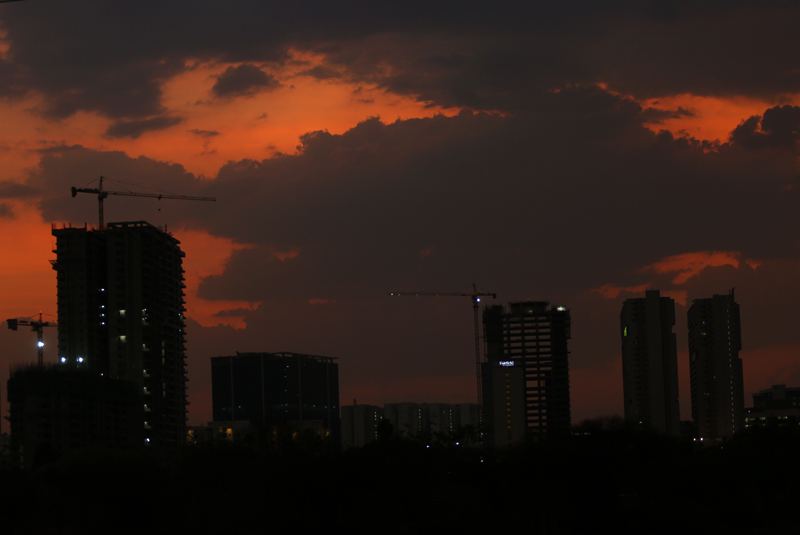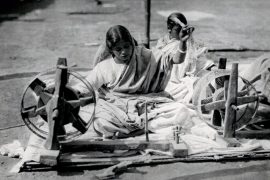In the last century, countries across the world have dammed rivers, built infrastructure and expanded industry and agriculture – all in the name of developing society. To do so, we harnessed water, mined minerals and metals, and mastered land and its inhabitants. Indeed, the use and abuse of nature has been par for the course in human progress.
But these actions are not without consequence. Aside from the developing climate and ecological crises, the way individuals, businesses and states relate to land constructs their identities. When these identities are challenged, it can define political arenas. As my ongoing research in India shows, it’s not just us who shape the land – the land shapes us too.
When humans undertake large development projects, we quite literally shape land. In levelling the earth, digging, or removing longstanding features such as boulders, we physically manipulate it. We also alter the microbial, animal, plant and human populations that existed on it before.
Development projects legally redefine land too. For example, in western India, I’ve been following a massive private development project centred around cement production. The project covers three thousand hectares on the coast of the Arabian Sea. It includes factories, mining operations, a port, a power plant and a settlement equipped with schools, shopping centres and a hospital. Much of this is on land that was until recently recognised as for common use.
Identity clash
Humans clearly remake land for their needs. But this process of influence doesn’t just go one way. Our relationships with land can fundamentally reshape our governments, markets, politics and societies.
Land marked for development is often passed off as wasted space. But such lands usually have a long history of supporting humans and wildlife. My research indicates that the land on which the cement project was built was home to a range of fishworking communities, pastoralists, forest produce pickers and farmers, as well as a wide range of animals and plants, and vital natural carbon stores including mangroves.
This fits an age old pattern. For centuries, humans have been privileging narratives of untouched or unproductive land ripe to be capitalised on.
Communities who inhabit such land have often built up working and spiritual relationships over generations, making it a central part of their identity. To the affected communities in western India, the development project means the loss of a mother, a nurturer, their connection to their ancestors, and their deities resident in the soil, rivers and coast.
Shaped by nature
Such clashes between displaced citizens and businesses looking to profit – shaped by their varying relationships with the land – deeply influence the political landscape.
In India, the state has largely supported private companies over the local populations, marking the government as pro-business. To justify this position and continue garnering votes, the country’s ruling party has routinely stoked nationalist sentiment and played up fears of terrorism.
For example, some politicians have used political tensions with nearby Pakistan to accuse dispossessed workers in the area of being connected with terrorism – without evidence. The government supports this perception by deploying security forces to guard ports, mines and factories.
Across the country, the state consistently portrays the rush of new development projects as a positive, nation-building exercise. Protesters, activists, students, dissenting journalists other people who don’t agree with this narrative are now openly termed anti-nationals.
Authoritarian nationalism and fears of terrorism have gripped India in recent years, and the deep bond with land felt by local people has played a central role in the rhetoric politicians have constructed to justify developing on it.
Election battlegrounds
Struggles over land and nature shape local politics too. Land struggles often give rise to political leaders who fight for the rights of local people and oppose national agendas. Election battlegrounds in my field sites weigh job promises of state collaborators with pledges to protect land from outsiders. These battlegrounds would never have developed had the land locals inhabited not deeply influenced their way of life and identity, and put these relationships in contest with a nationalist state and big business.
Similar stories to India’s are found all over the world. States such as Brazil, Mozambique, Indonesia, and Malaysia all engage in various shades of political manoeuvres to justify pro-business attitudes. These are a direct result of nature’s deep influence over the identity of communities inhabiting affected land.
States, businesses, individuals and the political interplay between them are all labelled and shaped by the natural world. Being aware of this helps us to bring nature to the forefront of our everyday lives. If we can keep it there, perhaps the next century of human development won’t come at such cost to the natural world.
This article was first published in The Conversation.
-30-
Copyright©Madras Courier, All Rights Reserved. You may share using our article tools. Please don't cut articles from madrascourier.com and redistribute by email, post to the web, mobile phone or social media.Please send in your feed back and comments to [email protected]











